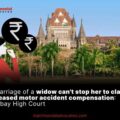
The Supreme Court of India reprimanded a lawyer representing the Maharashtra government in a land compensation case for submitting an affidavit considered “contemptuous” by a senior IAS officer. The court asserted that the lawyer should not have allowed such an affidavit to be filed. In response, the lawyer promptly apologized and informed the court that the state was withdrawing the affidavit. However, the court’s displeasure persisted, leading to an order for the IAS officer to appear in person. The Supreme Court also reminded the lawyer that they should not merely act as a messenger for their client but must fulfill their duties as an officer of the court.
The case involves land that the state of Maharashtra illegally occupied more than sixty years ago. The Supreme Court is now seeking ways to ensure the rightful landowner receives fair compensation. The court has directed the Maharashtra government to assess the current market value of the land near Pune. While the state had initially agreed to a compensation amount of Rs. 37 crore, the court has insisted on an updated valuation.
In response to the court’s inquiry, the IAS officer submitted a statement asserting that neither the landowner nor the court would accept the Pune Collector’s latest valuation. He stressed that it is the state’s responsibility to determine appropriate compensation according to legal provisions, with the latest assessment placing the compensation at Rs. 48.6 crore.
The Maharashtra government had proposed offering alternative land within the Pune municipal area instead of monetary compensation, but the landowner rejected this offer. The court then asked the landowner’s counsel, Dhruv Mehta, to consult with his client on whether they preferred monetary compensation or a land exchange. The court also directed both parties to jointly inspect the proposed land.
The Supreme Court noted that the state had not calculated the compensation based on the current market rate, accusing it of employing delaying tactics. The court remarked, “It is evident that the state has not fulfilled the assurances made by its counsel to the court. The state has once again offered compensation at the 1989 rate, along with interest on that amount. If the state had a valid reason for requesting additional time, it should have used it to provide a fair assessment of the compensation. It appears that the state is merely trying to drag out the case.”





